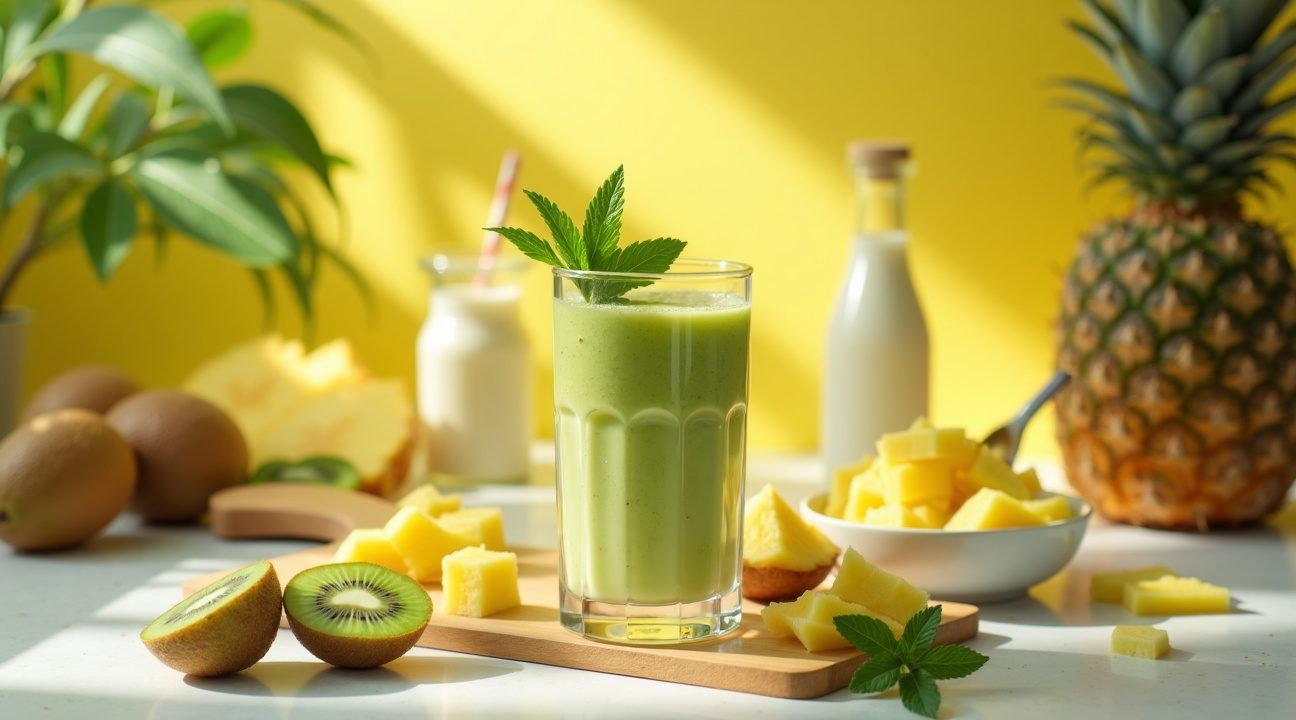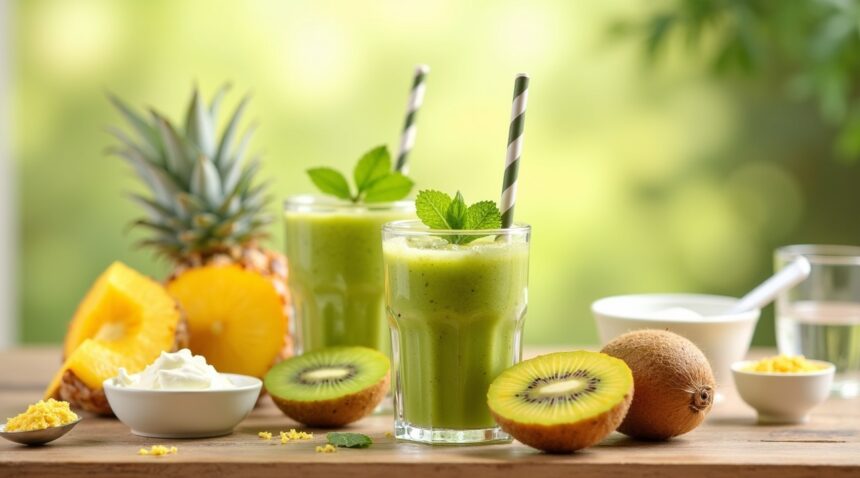Combining kiwi with pineapple creates a nutritional powerhouse that delivers over 270% of daily vitamin C needs while providing unique enzymes and antioxidants that work together to boost immunity and enhance skin health.
This tropical fruit duo offers complementary benefits, with kiwi’s exceptional vitamin C and fiber content pairing perfectly with pineapple’s inflammation-fighting bromelain enzyme and essential minerals like manganese.
Key Takeaways
- Exceptional Vitamin C Content: One cup each of kiwi (167mg) and pineapple (79mg) provides over 270% of daily vitamin C requirements, supporting immune function and collagen production for healthier skin.
- Powerful Enzyme Benefits: Pineapple’s bromelain enzyme offers anti-inflammatory properties and acts as a natural exfoliant, while working together with vitamin C to enhance immune support and reduce skin irritation.
- Superior Fiber and Digestive Support: Kiwi delivers 5.4 grams of fiber per cup (more than double pineapple’s content), promoting gut health and beneficial bacteria growth while supporting steady blood sugar levels.
- Comprehensive Antioxidant Protection: This combination provides vitamin E, carotenoids, polyphenols, and lutein that protect against free radical damage, slow aging signs, and maintain skin elasticity.
- Essential Mineral Content: Pineapple contributes 85% of daily manganese needs for women, supporting bone health and metabolism, while both fruits provide significant potassium and folate for overall cellular function.
To explore more about the unique health benefits of kiwis, visit this in-depth guide on kiwi nutrition.
https://www.youtube.com/watch?v=YfJ2olHg39g
The Power-Packed Vitamin C Duo That Delivers Over 270% of Your Daily Needs
I’ve discovered that combining kiwi and pineapple creates an extraordinary vitamin C powerhouse that significantly outperforms most other fruit combinations. One cup of sliced kiwi delivers approximately 167 mg of vitamin C, which represents over 185% of the daily recommended value. Meanwhile, a cup of fresh pineapple contributes around 79 mg of vitamin C, accounting for about 88% of daily needs.
Exceptional Antioxidant Protection From Nature’s Defense System
Both fruits contain powerful antioxidants that work synergistically to protect cells from damage. Kiwi stands out with its impressive array of protective compounds, including vitamin C, vitamin E, carotenoids, and polyphenols. These antioxidants actively defend against free radicals, which are unstable molecules that can harm healthy cells and weaken immune function.
Pineapple complements this protection through its own vitamin C content and additional antioxidant compounds. Together, these fruits create a comprehensive shield against oxidative stress, which is crucial for maintaining strong immunity and healthy skin. The high concentration of vitamin C in both fruits supports collagen production, helping maintain skin elasticity and repair damaged tissue.
Bromelain’s Unique Anti-Inflammatory Benefits
What makes this fruit combination particularly special is pineapple’s unique enzyme called bromelain. This powerful compound provides anti-inflammatory and immune-modulating effects that extend beyond basic vitamin C benefits. Bromelain actively supports the body’s defense system by helping reduce inflammation throughout the body.
Studies suggest that bromelain can enhance immune support by improving the absorption of other nutrients and reducing inflammatory responses. This enzyme works alongside vitamin C to create a more effective immune-boosting environment. The anti-inflammatory properties of bromelain may also contribute to improved skin health by reducing inflammation that can lead to skin issues.
The combination provides over 270% of daily vitamin C requirements when consuming one cup of each fruit. This exceptional level of antioxidant protection creates an ideal environment for immune system optimization. Regular consumption of this vitamin C duo can help maintain consistent immune support while promoting healthy, radiant skin through enhanced collagen synthesis and cellular protection.
How This Fruit Combination Transforms Your Skin From the Inside Out
Vitamin C stands as the cornerstone of this powerful skin transformation, with both kiwi and pineapple delivering exceptional amounts of this critical nutrient. Pineapple provides an impressive 88% of the daily value per cup, while kiwi surpasses that by offering over double the amount. This abundant vitamin C intake directly supports collagen synthesis, the fundamental process that maintains skin structure and elasticity throughout life.
Collagen acts as the scaffolding that keeps skin firm, smooth, and youthful-looking. When vitamin C levels remain consistently high through regular consumption of this fruit combination, the body can efficiently produce and maintain healthy collagen networks. This enhanced collagen production doesn’t just improve appearance – it also accelerates wound healing, helping cuts, scratches, and blemishes repair themselves more quickly.
Antioxidant Powerhouse Protection
Beyond vitamin C, kiwi brings additional skin-protecting compounds to this dynamic duo. The fruit contains significant amounts of vitamin E and lutein, both powerful antioxidants that work synergistically to protect skin cells from environmental damage. These antioxidants create a protective shield against free radicals that would otherwise accelerate aging and cause cellular damage.
Vitamin E specifically targets skin health by protecting cell membranes and supporting the skin’s natural moisture barrier. Combined with kiwi’s lutein content, these nutrients help maintain skin’s natural glow while preventing the formation of fine lines and age spots. Regular consumption of this antioxidant-rich combination can visibly slow signs of premature aging, keeping skin looking vibrant and healthy for years longer.
The anti-aging benefits extend beyond surface-level improvements. These antioxidants penetrate deep into skin layers, protecting collagen fibers from breakdown and supporting cellular regeneration processes. Just as quality sleep helps with cellular repair, consistent antioxidant intake from kiwi and pineapple creates optimal conditions for skin renewal.
Pineapple contributes its own unique skin-transforming element through bromelain, a natural enzyme with remarkable properties. This compound acts as a gentle, natural exfoliant, helping remove dead skin cells and promoting the emergence of fresh, healthy skin underneath. Unlike harsh chemical exfoliants, bromelain works gradually and naturally, reducing the risk of irritation while still delivering effective results.
Bromelain’s anti-inflammatory properties make it particularly valuable for people dealing with various skin conditions. The enzyme helps reduce redness, swelling, and irritation that can plague sensitive or problematic skin. One clinical study demonstrated that bromelain supplementation could actually reverse certain chronic skin conditions, showcasing its therapeutic potential beyond basic nutrition.
The inflammation-fighting capabilities of bromelain work both topically and systemically. When consumed regularly through pineapple, this enzyme helps reduce overall inflammation levels throughout the body, which often manifests as clearer, calmer skin. Chronic inflammation contributes to numerous skin problems, from acne to premature aging, making bromelain’s anti-inflammatory action particularly valuable.
This fruit combination creates a comprehensive approach to skin health that addresses multiple factors simultaneously. The vitamin C supports structural integrity through collagen production, while antioxidants protect against environmental damage and aging. Meanwhile, bromelain provides gentle exfoliation and inflammation control, creating optimal conditions for healthy skin renewal.
The synergistic effect of eating these fruits together amplifies their individual benefits. Much like how morning routines can set the tone for the entire day, incorporating this nutrient-dense combination into daily eating habits establishes a foundation for long-term skin health. The cumulative effect builds over time, with consistent consumption leading to increasingly noticeable improvements in skin texture, tone, and overall appearance.
Why Kiwi’s Fiber Content Makes It the Perfect Digestive Partner for Pineapple
Kiwi stands out as a fiber powerhouse that complements pineapple’s digestive benefits perfectly. Kiwi delivers 5.4 grams of dietary fiber per cup, significantly outpacing pineapple’s 2.3 grams per cup. This substantial difference makes kiwi an exceptional partner for supporting comprehensive digestive health.
Maximizing Fiber Intake Through Smart Consumption
Eating kiwi with its skin intact transforms the fruit’s nutritional profile dramatically. Consuming the skin increases fiber intake by up to 50%, creating a powerful foundation for digestive wellness. The skin contains concentrated nutrients that work synergistically with the flesh to promote optimal gut health.
Many people discard kiwi skin unnecessarily, missing out on significant prebiotic benefits. The combined fiber from both the skin and flesh creates an ideal environment for beneficial gut bacteria to thrive. This enhanced fiber content supports regular bowel movements and maintains healthy digestive rhythm.
The Science Behind Kiwi’s Digestive Superiority
Kiwi’s high fiber content creates a perfect complement to pineapple’s enzymatic properties. While morning coffee myths often overshadow actual digestive aids, kiwi provides genuine fiber-based support that promotes long-term gut health. The fruit’s unique fiber composition includes both soluble and insoluble varieties, creating comprehensive digestive benefits.
Dietary fiber from kiwi acts as a natural prebiotic, feeding beneficial bacteria throughout the digestive system. This fiber content helps regulate digestion more effectively than many processed supplements. The fruit’s natural sugars provide energy for beneficial microorganisms while the fiber creates the structural support they need to flourish.
Combining kiwi with pineapple creates a synergistic effect where each fruit enhances the other’s digestive benefits:
- Pineapple’s bromelain enzyme aids protein digestion.
- Kiwi’s fiber supports bowel regularity and prebiotic nourishment.
This partnership addresses multiple aspects of digestive wellness simultaneously.
The fiber in kiwi also helps slow sugar absorption, preventing the rapid blood sugar spikes that can sometimes occur with fruit consumption. This steady release supports sustained energy levels while maintaining optimal digestive function. Regular consumption of this fiber-rich fruit combination promotes consistent bowel health and supports the growth of beneficial gut bacteria.
Kiwi’s fiber content remains stable even when stored properly, making it a reliable source of digestive support year-round. I recommend incorporating this powerful fruit pairing into daily routines for maximum digestive benefits. The combination provides natural, gentle support that works with the body’s existing digestive processes rather than forcing artificial changes.
The Hidden Mineral Powerhouse: Manganese and Essential Micronutrients
When I think about tropical fruits and their nutritional benefits, most people focus on vitamin C content, but pineapple delivers something equally important that often gets overlooked. A single cup of pineapple provides an impressive 1.54 mg of manganese, which represents 85% of the daily value for women and 67% for men.
Manganese’s Critical Role in Body Function
This powerful mineral works behind the scenes to support bone health by helping form connective tissues and bones. Manganese also plays a vital role in metabolism, assisting enzymes that break down carbohydrates and amino acids. Without adequate manganese intake, the body struggles to maintain proper bone density and efficient metabolic processes.
Combined with kiwi, this fruit pairing creates a micronutrient symphony that extends far beyond vitamin C:
- Kiwi contributes significant amounts of folate, which supports DNA synthesis and red blood cell formation.
- Both fruits deliver substantial potassium, a mineral that helps regulate blood pressure and supports proper muscle function.
Hydration and Trace Elements
The high water content in both kiwi and pineapple makes this combination particularly effective for hydration. I find this aspect often underestimated, yet proper hydration supports every cellular process in the body. The water content helps transport nutrients efficiently while maintaining optimal skin moisture from within.
Even trace amounts of iodine found in these fruits contribute to thyroid function, though in smaller quantities than what you’d find in morning coffee or seafood sources. These micronutrients work synergistically, meaning their combined effect often exceeds what each would provide individually.
The folate in kiwi particularly complements the manganese in pineapple for cellular repair processes. While many people focus on single nutrients, I’ve learned that this comprehensive micronutrient profile supports multiple body systems simultaneously. The potassium content helps maintain proper fluid balance, which directly impacts both skin hydration and immune cell function.
This mineral combination creates a foundation for sustained energy production and cellular repair that goes beyond what most people expect from fruit consumption. Rather than viewing these as simple snacks, understanding their micronutrient density reveals why this pairing delivers such noticeable health benefits. The manganese alone makes pineapple one of the most mineral-dense fruits available, while kiwi’s folate content supports the body’s ability to utilize these minerals effectively.
Nutritional Breakdown: How Kiwi and Pineapple Compare Side by Side
I’ve analyzed the nutritional profiles of these tropical powerhouses to show you exactly what each fruit brings to your immunity-boosting arsenal. The differences between kiwi and pineapple reveal why combining them creates such a potent health duo.
Vitamin C Content: The Clear Winner
Kiwi absolutely dominates the vitamin C category, delivering 167 mg per cup compared to pineapple’s 79 mg. This means kiwi provides over double the vitamin C content, making it one of the richest sources available in nature. I find this particularly impressive since most people assume citrus fruits reign supreme in this category. However, pineapple still contributes substantial vitamin C levels that complement kiwi’s powerhouse dose.
The combined vitamin C from both fruits creates an immunity fortress that far exceeds daily requirements. While the body needs only 65–90 mg of vitamin C daily, this dynamic duo delivers nearly 250 mg together. This abundance supports collagen production for healthier skin while strengthening your immune system’s defense mechanisms.
Fiber and Digestive Benefits
Kiwi takes the lead again with 5.4 grams of fiber per cup, more than double pineapple’s 2.3 grams. This higher fiber content supports digestive health and helps maintain steady blood sugar levels. I appreciate how kiwi’s fiber works differently than many other fruits, containing both soluble and insoluble types that promote gut health.
Pineapple compensates with its unique enzyme bromelain, which kiwi lacks entirely. This powerful enzyme aids protein digestion and reduces inflammation throughout the body. Research shows bromelain may also support wound healing and reduce skin irritation, making it a valuable addition to any skin health regimen.
The calorie difference between these fruits is minimal:
- Kiwi: 110 calories per cup
- Pineapple: 82 calories per cup
Both provide excellent nutritional density for their caloric content. Pineapple excels in manganese content with 1.54 mg per cup compared to kiwi’s 0.1 mg, supporting bone health and antioxidant enzyme function.
When I combine these fruits, I’m getting complementary nutrients that work synergistically. Kiwi’s superior vitamin C and fiber content pairs perfectly with pineapple’s bromelain and manganese. This combination creates a nutritional profile that supports both immune function and skin health more effectively than either fruit alone.
Simple Ways to Combine Kiwi and Pineapple for Maximum Health Benefits
I’ve discovered that mixing kiwi and pineapple isn’t just delicious—it’s a powerhouse combination that delivers incredible health benefits. These two fruits work together to create synergistic effects that amplify their individual nutritional properties.
Quick and Easy Preparation Methods
Creating healthy kiwi-pineapple combinations doesn’t require complicated recipes or special equipment. A simple smoothie offers one of the most convenient ways to enjoy this dynamic duo daily. I blend two peeled kiwis with fresh pineapple chunks and add milk or a non-dairy alternative for creaminess. This creates a refreshing drink that’s perfect for breakfast or an afternoon energy boost.
Fruit salad provides another excellent option for incorporating these fruits into your routine. I dice equal portions of kiwi and pineapple, then mix them together for a naturally sweet snack that requires zero cooking. The combination works beautifully as a light dessert or a side dish that complements heavier meals. Adding fresh mint leaves enhances both flavor and digestive benefits.
Health shots represent the most concentrated way to consume these fruits’ benefits. I prepare these using a specific blend that maximizes nutritional impact while maintaining great taste. The process takes just minutes but delivers lasting health benefits throughout the day.
Power-Packed Health Shot Recipe
My go-to health shot recipe combines specific ingredients in precise amounts to optimize both taste and nutrition:
- 2 kiwis, peeled and chopped
- 4 oz fresh pineapple chunks
- 150 ml milk or non-dairy alternative
- 4 tbsp natural live yogurt (optional)
- Fresh mint leaves for garnish and flavor
I blend all ingredients until smooth, creating a concentrated shot that delivers vitamin C, fiber, and beneficial enzymes in one powerful serving. The natural live yogurt adds probiotics that support digestive health while complementing the fruits’ natural enzymes. This combination helps your body absorb nutrients more effectively while promoting healthy gut bacteria.
The milk component provides protein and calcium, making this shot more satisfying than juice alone. Non-dairy alternatives like almond or oat milk work equally well and add their own nutritional benefits. I find that morning consumption provides the best results, as your body can utilize these nutrients throughout the day.
Fresh fruit combinations like this offer advantages over processed alternatives because they retain all their natural fiber and enzymes. The fiber content helps regulate blood sugar levels while promoting feelings of fullness. This makes kiwi-pineapple combinations excellent choices for weight management and sustained energy.
I’ve noticed that preparing these combinations fresh ensures maximum vitamin retention and flavor. Kiwis should be ripe but firm, while pineapple should smell sweet at the base. Both fruits can be prepared in advance and stored in the refrigerator for up to three days without significant nutrient loss.
The natural enzymes in this combination—particularly bromelain from pineapple and actinidin from kiwi—work together to support digestion and reduce inflammation. These enzymes help break down proteins more efficiently, which can improve nutrient absorption and reduce digestive discomfort.
Regular consumption of this fruit combination has been linked to improved immune function and enhanced skin appearance. The high vitamin C content supports collagen production while the antioxidants help protect against environmental damage. I recommend consuming these combinations consistently rather than sporadically for the best results.
Storage tip: I prepare larger batches and freeze individual portions in ice cube trays. This allows me to quickly blend frozen cubes with liquid for instant smoothies or health shots. The frozen approach actually helps create a thicker, more satisfying texture while preserving nutrients effectively.

Sources:
Weekand, “What Are the Benefits of Kiwis & Pineapples?”
Healthline, “Does Pineapple Have Benefits for Your Skin?”
Babble Health, “Pineapple and Kiwi Iodine Rich Health and Fertility Shot”
Healthline, “Can You Eat Kiwi Skin?”
Healthline, “Surprise Kiwi Skin Is Edible — and Really Good for You”
Lemon8, “Refreshing Kiwi Lime Pineapple Coconut Energy Drink Recipe”


